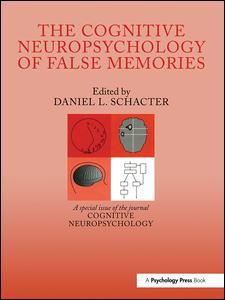The Cognitive Psychology of False Memories A Special Issue of Cognitive Neuropsychology
Coordonnateur : Schacter Daniel L.

People sometimes remember events that never happened. These illusory or false memories have important practical implications in various aspects of everyday life, and also have significant theoretical implications for cognitive and neuropsychological models of memory. Cognitive psychologists and neuropsychologists have long been aware of false recognition, confabulation, and related kinds of memory distortions, but during the past several years research on these topics has increased rapidly.
In recognition of this emerging domain of interest, this special issue of Cognitive Neuropsychology is devoted to the cognitive neuropsychology of false memories. Edited by Daniel L. Schacter, the special issue features experimental and theoretical contributions from leading cognitive psychologists, neuropsychologists, and neurologists that explore such issues as false recognition after frontal lobe damage, the nature of confabulation, amnesia and false memories, physiological correlates of memory illusions, memory distortions in normal and abnormal aging, and computational models of true and false memories.
M. Kopelman, Varieties of False Memory. S. Dab, C. Thierry, J. Morais, T. Shallice, Confabulation with a Selective Descriptor Process Impairment. A.J. Parkin, J. Ward, C. Binschaedler, G. Powell, E.J. Squires, False Recognition Following Frontal Lobe Damage: The Role of Encoding Factors. W. Koutstaal, D.L. Schacter, M. Verfaellie, C. Brenner, E.M. Jackson, Perceptually-based False Recognition of Novel Objects in Amnesia: Effects of Category Size and Similarity to Category Prototypes. S.R. Rubin, C. Van Petten, E.L. Glisky, W.M. Newberg, Memory Conjunction Errors in Younger and Older Adults: Event-related Potential and Neuropsychological Data. E. A. Kensinger , D.L. Schacter, When True Memories Suppress False Memories: Effects of Aging. L.L. Jacoby, Deceiving the Elderly: Effects of Accessibility Bias in Cued-recall Performance. S.Z. Rapcsak, S.L. Reminger, E.L. Glisky, A.W. Kaszniak, J.F. Comer, Neuropsychological Mechanisms of False Facial Recognition Following Frontal Lobe Damage. D.L. Balota, M.J. Cortese, J.M. Duchek, D. Adams, H.L. Roediger III, K.B. McDermott, B.E. Yerys, Veridical and False Memories in Healthy Older Adults and in Dementia of the Alzheimers Type. M. Mather, M.K. Johnson, D.M. DeLeonardis, Age-related Differences in Stereotype Reliance: Old/New Recognition, Source Identification, and Neuropsychological Test Correlates. R. Dodhia, J. Metcalfe, Inhibition of False Memories: CHARM's Prediction in the Source Monitoring Paradigm.
Date de parution : 05-2019
18.9x24.6 cm



